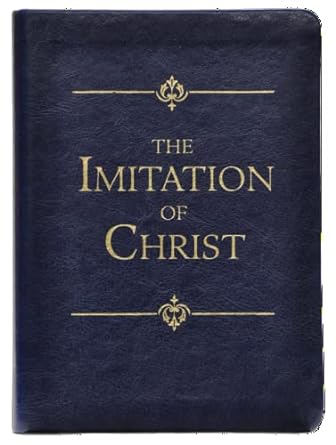Beginning Tuesday, April 7 we will begin reading through The Imitation of Christ. If you need us to order a book for you, please let me know. We are using this version with commentary or this version without the commentary or you can read the book online.
If you remember C.S. Lewis’s Introduction to On the Incarnation that we read last year, he implores us to read “old books” in order for us to maintain a robust faith that will wither if fed only a diet of contemporary views. The Imitation of Christ is one of these great old books. It was published in the early 1400s, a century before Martin Luther’s 95 Theses began the Reformation and only a few generations removed from the Black Death. It was written by a monastic for his community and so it emphasizes the contemplative and ascetic aspects of our faith. The Imitation is the high point of medieval Christian spirituality. However, because it is an old book its perspectives and emphases on the Christian life are different than ours. Therefore, before beginning The Imitation please read the attached “Introduction” and “How to Read” from the Commentary. These will give you a deeper understanding of á Kempis’ outlook and purposes in writing his great work.
The Imitation is also a very different type of book than we usually read. Lewis writes that literature is both content (logos) and form (poeima). Content is the facts that are conveyed, but the form is the spirit that is conveyed. And in analyzing the content, we can often kill the spirit. For example, there is a substantive difference in reading Elizabeth Barrett Browning’s Sonnet 43 (“How do I Love Thee”) as written and analyzing the work to the point of reducing it to its mere content of “Elizabeth loves her fiancé a lot.” So with The Imitation of Christ. Merely reducing the work to the bullet points of its content impairs its overall message and power. Therefore, approach the book with a contemplative heart and not an analytical mind. When you begin to read through The Imitation, find a quiet place. Pray. Read one chapter at a time. Reflect on the reading. Allow the reading to soak deep within you. Respond to the reading. If the response elicits a connection with the Scriptures or another work, go there. It is best, though not required, that you read only one chapter at a time. We will read through no more than five chapters a week in order to allow us appropriate time and space for each contemplation.
I am looking for to exploring this work within our group during this upcoming Easter season. If you need a copy of the book, please let me know. And, as always, please feel free to bring a friend.
Create in me a clean heart, O God,
Psalm 51: 10-12, 15-17
and put a new and right spirit within me.
Do not cast me away from your presence,
and do not take your holy spirit from me.
Restore to me the joy of your salvation,
and sustain in me a willing spirit.
O Lord, open my lips,
and my mouth will declare your praise.
For you have no delight in sacrifice;
if I were to give a burnt offering, you would not be pleased.
The sacrifice acceptable to God is a broken spirit;
a broken and contrite heart, O God, you will not despise.

